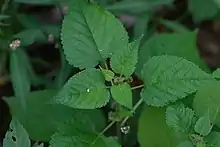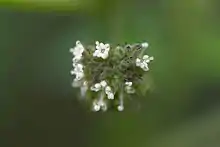Fatoua villosa
Fatoua villosa is an annual herb in the Moraceae (mulberry) family, native to Asia.[1] Common names include mulberry weed, crabweed, or hairy crabweed.[2] It has become an invasive species in the Eastern United States where it grows in disturbed areas such as flowerbeds, greenhouses, and agricultural fields.[1]
| Fatoua villosa | |
|---|---|
 | |
| Scientific classification | |
| Kingdom: | Plantae |
| Clade: | Tracheophytes |
| Clade: | Angiosperms |
| Clade: | Eudicots |
| Clade: | Rosids |
| Order: | Rosales |
| Family: | Moraceae |
| Genus: | Fatoua |
| Species: | F. villosa |
| Binomial name | |
| Fatoua villosa (Thunberg) Nakai[1] | |
| Synonyms[1] | |
|
Urtica villosa Thunberg | |
Description

F. villosa is an annual herb which reproduces via seed. The entire plant is covered in both glandular and recurved hairs giving the plant a sticky feeling to the touch.[2] The leaves resemble the leaves of mulberry giving rise to the common name of mulberry-weed. The leaves are heart shaped and up to 10 cm long with a crenate leaf margin.[1] At the base of each leaf is a pair of stipules. It is a monoecious plant meaning that it has separate male and female flowers on the same plant. The male and female flowers are aggregated into axillary clusters. The fruit is single seeded and explosively shoots the seed up to several meters.[1]
Invasive

Mulberry weed has been collected extensively in flowerbeds and greenhouses which strongly suggests that the plant is spread via horticultural material.[3] It was first reported in Louisiana in 1964 and has since spread as far north as Michigan[4] and Massachusetts[5] and as far west as California. It will likely continue to spread and may become more invasive.[2]
Bibliography
- Flora of North America : north of Mexico. Oxford University Press. 1997. ISBN 9780195112467.
- Weakley, Alan (2015). Flora of the Southern and Mid-Atlantic States. Chapel Hill North Carolina: The University of North Carolina Herbarium.
- Vincent, Michael (1993). "Fatoua villosa (Moraceae), Mulberry Weed in Ohio" (PDF). Ohio Journal of Science. 93 (5): 147–149.
- Reznicek, A. (1 May 2001). "Mulberry Weed (Fatoua Villosa) Spread as Far North as Michigan". The Michigan Botanist. 40 (3): 73–74. ISSN 2166-4374.
- Miller, Norton G.; Wood, Carroll E. (2003). "The Asian Weed Fatoua Villosa (Moraceae) in New York State and Massachusetts". Rhodora. 105 (923): 286–291. JSTOR 23313486.